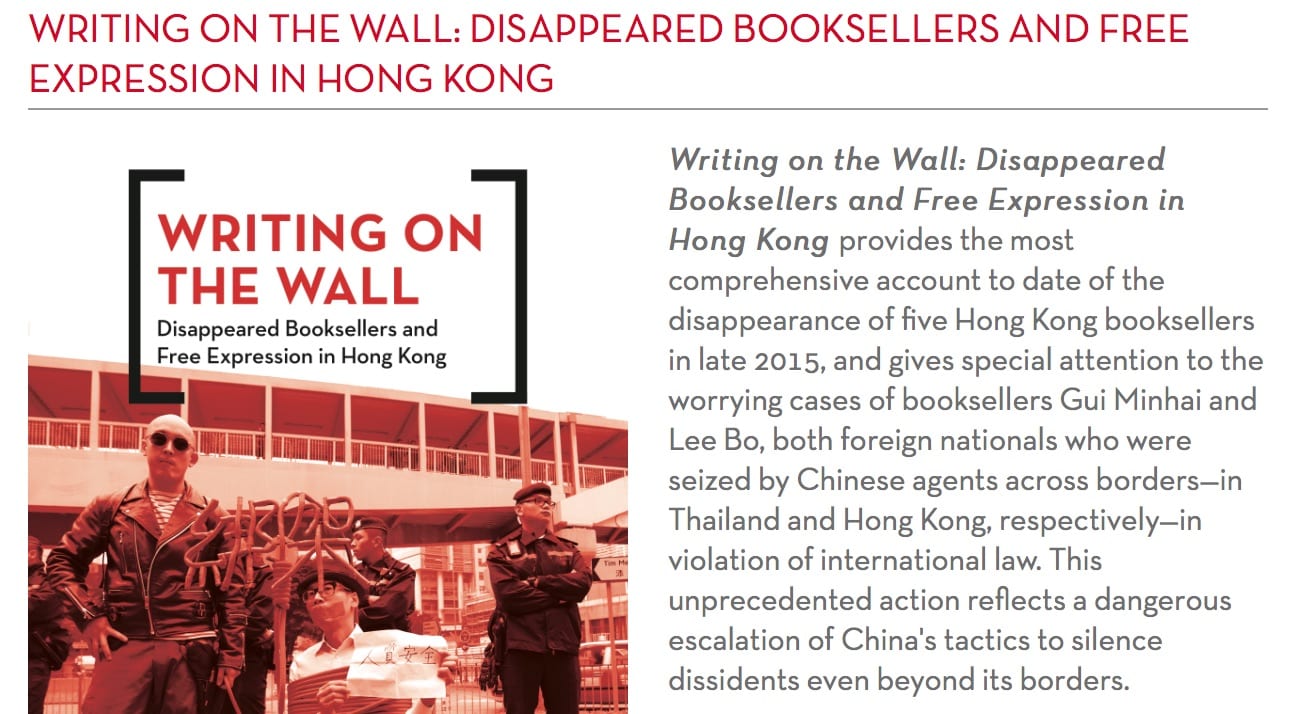Under helgen släppte PEN America en ny, drygt 50 sidor lång rapport vid namn ”Writing on the Wall: Disappeared Booksellers and Free Expression in Hong Kong”. Innehållet diskuterar den allt sämre yttrandefriheten i Hongkong, med fokus på den kidnappade svenska förläggaren Gui Minhai och hans kollegor.
Rapporten menar att brittiska och svenska myndigheter agerat alldeles försiktig i frågan, vilket framför allt beror på en rädsla att uppröra Kina och därmed riskera att skada handelsrelationer och annat ekonomiskt utbyte.
Under rubriken ”The International Community’s Response” sammanfattas hur media, politiker och civilsamhälle i olika länder reagerat på kidnappningarna av de fem förläggarna. I delen som gäller Sverige citeras jag, tillsammans med en rad andra aktörer som också menar att reaktionen varit alldeles för svag.
Märkbart är att Gui Minhais dotter Angela Gui under årets bokmässa upptäckte hur flera svenskar som i yttrandefrihetens namn under mässan kampanjade för den fängslade journalisten och förläggaren Dawit Isaak, samtidigt inte hade en aning om vem Gui Minhai är:
Michael Caster, an American human rights advocate and former colleague of Dahlin, wrote in an op-ed on the anniversary of Gui’s disappearance that “Sweden’s unwillingness to push his case as forcefully as we might expect if he was a natural born citizen” has played into China’s goal of “attempting to block his access to international support” by refusing to acknowledge Gui’s Swedish citizenship.
Another critic, Beijing-based Swedish journalist Jojje Olsson, put it forcefully in a January 2016 article: “Sweden’s authorities have so far shown little interest in helping the Swedish citizen Gui Minhai. This may sadly be because Gui is not ethnically Swedish and does not have a Swedish last name.” To support his claims, Olsson pointed to a collection of Twitter comments by journalists criticizing Sweden’s “reluctan[ce] to say anything,” including one by New York Times correspondent Michael Forsythe arguing, “If Gui had blonde hair and blue eyes, ya gotta wonder.”
Sweden’s government rejects these assertions, stating, “Ethnicity or any prior citizenship does not influence how the consular mission is carried out.” But Sweden has emphasized an approach of “quiet diplomacy,” preferring inter- governmental interactions over extensive public expressions of concern, and defining the case primarily as a consular one.
Where Sweden has made public statements, Caster notes, it has often been in response to high-profile developments: The denunciatory statement by Foreign Minister Wallstrom in late January, for example, came after Dahlin’s televised “confession.” Wallstrom addressed both Dahlin and Gui’s cases in her brief statement. A September statement from Wallstrom publicly calling for an end to Gui’s detention came after Gui’s daughter Angela Gui made a public appeal on Swedish television.
This October, Swedish legislator Hans Linde argued, in a legislative inquiry to the foreign minister, that “as the media attention has increased” and as other governmental and inter-governmental bodies have taken up the issue, the Swedish government “needs to change its strategy.” Dahlin himself recently critiqued Sweden’s “quiet diplomacy” approach, concluding in an October 29 interview with Sweden’s SVT News that Sweden could more forcefully advocate for Gui: “How long has it actually been without any response from China on Gui Minhai? Should we wait another year before we start thinking about other activities to support him?”
Speaking with PEN America, Angela Gui shared her views on the insufficiency of the diplomatic route, noting that while such an approach may have originally seemed to offer China a “quiet exit” in her father’s case, it has clearly failed to achieve that purpose. As she explained:
”It’s been clear for months now that if they wanted to find a quiet exit, they would have done so already. And it’s quite clear to me that what they want to do is keep my father for as long as possible, and if the international community stays quiet, it’s just going to be forgotten about and the Chinese will keep him as long as they like.”
Angela Gui also expressed concern that the Swedish media had not done enough to raise awareness among the public that one of their citizens remains in incommunicado detention. At the Gothenburg Book Fair in September, she noted:
”I saw people campaigning at the book fair, activists who were asking people to sign a petition on behalf of Dawit Isaak [a Swedish journalist imprisoned in Eritrea since 2001]. I asked them, What are you doing for the case of Gui Minhai? And they responded, ’Who is that?’ Almost a year since my father was abducted, that’s really a shocking response.”
Förutom Gui Minhai med kollegor så ger rapporten en gedigen bakgrund till relationen Kina-Hongkong, samt hur Kinas växande inflytande över Hongkong har lett till en klar försämring av stadens en gång så välkända yttrande- och pressfrihet.
Exempelvis påpekas att elva av de sexton butiker på Hongkongs flygplats som tidigare sålde politiskt känsliga böcker har stängt, samt att försäljningen av samma litteratur minskat drastiskt i helhet. Anledningen är åtgärder som hot och nya bestämmelser från kinesiska myndigheter.
I rapportens sista del utfärdar PEN America en rad rekommendationer till olika myndigheter och andra aktörer, om hur de bör agera för att visa respekt för yttrande- och pressfrihet och i förlängningen även för mänskliga rättigheter. Följande rekommendationer ges till Sverige:
To the government of Sweden
* Strongly consider more public avenues of diplomacy and engagement in order to obtain the release from incommunicado detention of Swedish citizen Gui. This response may include additional and more forceful public expressions of concern from Sweden’s highest officials, open discussion of Gui’s case by the Riksdag or by other government bodies—with such discussion culminating in official conclusions and recommendations for further government engagement—and consideration of political ramifications in light of China’s continued denial of consular access.
* Commit to additional public statements denouncing the continued lack of consular access to Gui.
* Continue to publicly call for a full and public explanation of the circumstances regarding the disappearance, continuing detention, and apparent coerced confession of Gui.
Rapporten kan läsas i sin helhet här nedan, i större version via Scribd eller PEN Americas hemsida.





